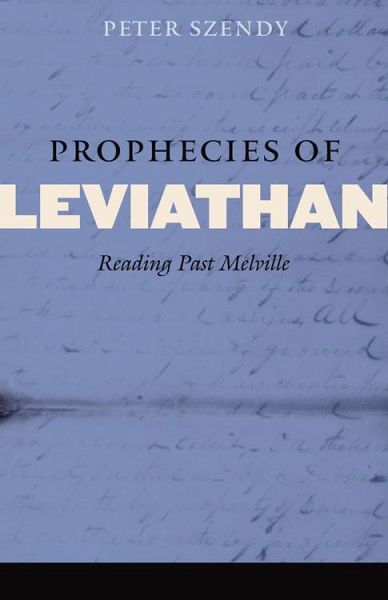
Prophecies of Leviathan
Reading Past Melville
Übersetzer: Anidjar, Gil

PAYBACK Punkte
20 °P sammeln!
Reading Melville is not only reading. Reading Melville means being already engaged in the abyssal process of reading reading. Reading what reading is and what reading does. With Melville, Prophecies of Leviathan argues that reading, beyond its apparent linearity, is essentially prophetic, not only because Moby Dick, for example, may appear to be full of unexpected prophecies (Ishmael seems to foretell a "Grand Contested Election for the Presidency of the United States" followed by a "bloody battle in Afghanistan") but also, and more deeply, because reading itself is a prophetic experience that...
Reading Melville is not only reading. Reading Melville means being already engaged in the abyssal process of reading reading. Reading what reading is and what reading does. With Melville, Prophecies of Leviathan argues that reading, beyond its apparent linearity, is essentially prophetic, not only because Moby Dick, for example, may appear to be full of unexpected prophecies (Ishmael seems to foretell a "Grand Contested Election for the Presidency of the United States" followed by a "bloody battle in Afghanistan") but also, and more deeply, because reading itself is a prophetic experience that Melville captured in a unique way. Reading, according to Melville, might just be the prophecy of the text to come. This apparently tautological view has great consequences for the theory of literature and its relation to politics. As Szendy suggests, the beheading of Melville's "Leviathan" (which, Ishmael says, "is the text") should be read against Hobbes's sovereign body politic. Szendy's reading of Melville urges us to revisit Jacques Derrida's all too famous sentence: "There is no hors-texte." And it also urges us-as the preface to this English edition makes clear-to reflect on the (Christian) categories that we apply to the text: its life, death, and, above all, afterlife or suicide. The infinite finitude of the text: that is what reading is about. In his brilliant and thorough afterword, Gil Anidjar situates Prophecies of Leviathan among Szendy's other works and shows how the seemingly tautological self-prophecy really announces a new "ipsology," a "pluralization of the self" through a "narcissism of the other thing."












